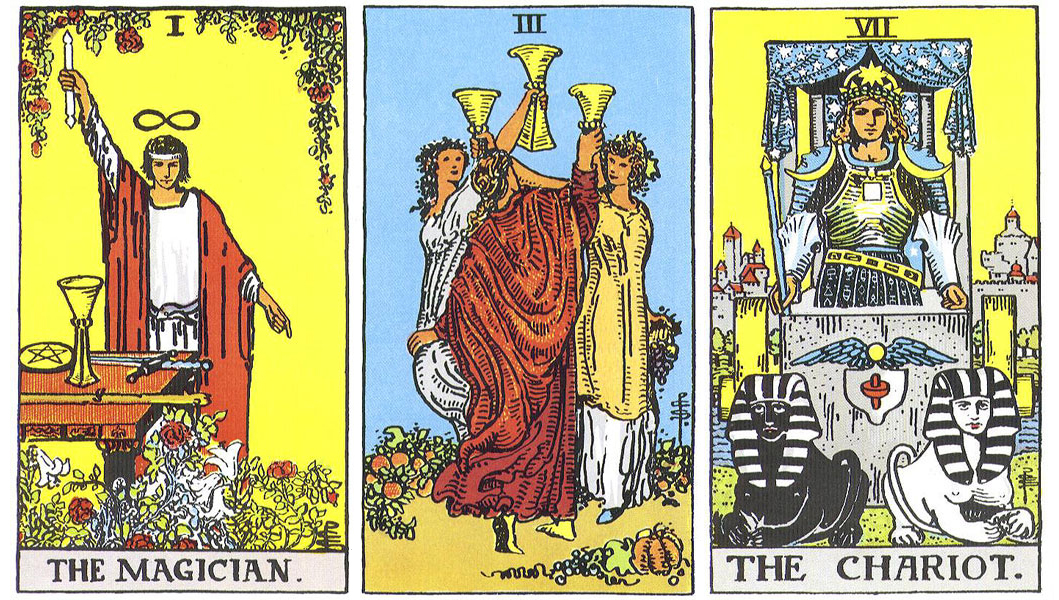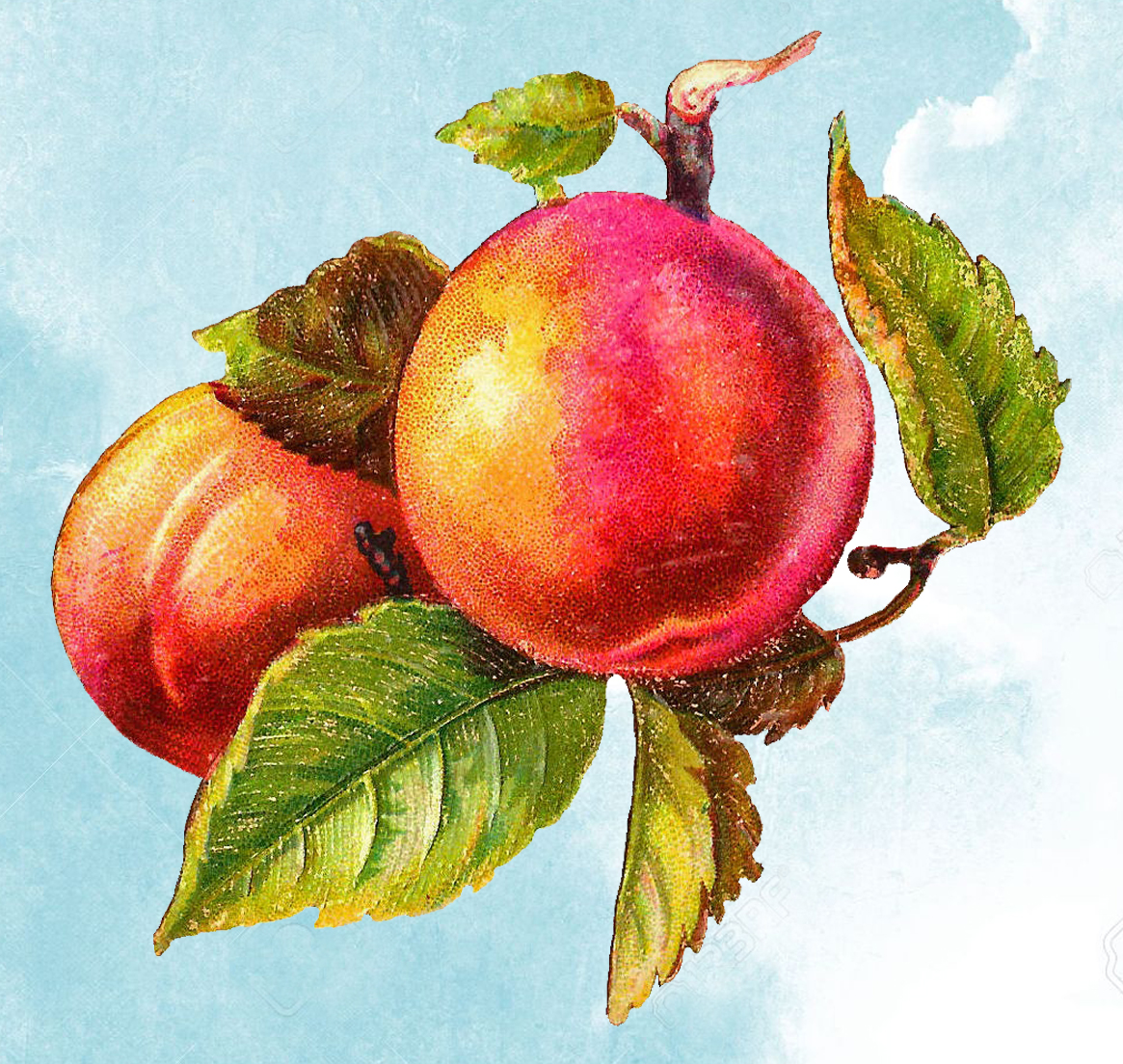3 of Cups: Cancer II
Decan ruler (Chaldean): Mercury
Hermetic Title: Abundance
Corresponding major arcana: The Magician [Mercury] + The Chariot [Cancer]
Dates: July 2 - July 11
The Three of Cups, a beloved East Village neighborhood restaurant, closed in 2018 after 26 years in business.
On the face of it, the 3 of Cups is not a complex card. Three dancing, flower-crowned women raise their cups in a celebratory toast. The atmosphere is one of relaxation, mirth, and enjoyment. In this decan, fruits swell on their trees in the northern hemisphere's summer. We enjoy abundant food and drink, as well as abundant good will. Most tarot readers can recall drawing this card on the occasion of a meal or celebration with female relatives or close women friends.
Abundance vs. scarcity
Back in the 1990s, I started hearing a new term being thrown around by friends who'd been to therapy: "scarcity mindset". This was Manhattan shortly after the savings-and-loan crisis; the bullish 80's were fast receding into memory. "Scarcity mindset," as I understood it, had to do with thinking life was a zero-sum game, a competition for scarce resources. You can't afford to be generous when the stakes are your own survival! The antidote? "Abundance mindset" - the sense that there is more than enough for everyone.
The majors corresponding to the 3 of Cups are the Magician and the Chariot. Their paths both connect to the 3rd sephira: Binah, the Great Mother.
I instantly recognized myself as a victim of scarcity mindset; though really, I suspect there's nothing special in that. Most people cope with some level of anxiety and scarcity perception. What does scarcity mindset look like in tarot? I can't decide whether the 5 of Disks ("Lord of Worry") or the 5 of Swords ("Lord of Defeat") is a better representation, but I definitely know the 3 of Cups is the remedy. It's literally the "Lord of Abundance".
And you know what's interesting? Let's look at the numbers: 5 ("Worry" or "Defeat") and 3 ("Abundance"). What lies between the 5th and 3rd sephiroth, Binah and Geburah, on the Tree of Life? That's right - the path of the Chariot. The Chariot, which corresponds to the sign of Cancer, and which along with the Magician forms the character of the 3 of Cups.In fact, maybe you could say that the 3 of Cups is the result of adding "magical thinking" to an "abundance mindset". The Magician represents the connection between "As Above" and "So Below"; the Chariot represents the vessel which bears the soul between Above and Below.
So, safe conduct of the soul between realms is a theme of both. Perhaps we are only free to move when we feel truly secure. Perhaps the secret of generosity is to know we are so intrinsically well protected we have no need for self-defense. (Recall that Jupiter's exaltation degree is hidden at the center of this decan.)
Themes of enclosure.
That protective enclosure or sense of safety comes to us courtesy of Binah, the great source of Form on the Tree of Life, as mentioned, and it's a quality of all 3's in tarot. But it's even moreso the case through the 3 of Cups' connection with Cancer. We spoke about the Crab's armor in the last decan post; the fence or wall of Hebrew letter ח chet. But whereas in the 2 of Cups, Empress Venus made a door in the fence, letting love through and making fertilization possible, here the walls encircle their precious contents without breach. Here, only one can pass in or out - Mercury, to whom no wall is an obstacle; Mercury, who brings the soul to and from the world of the living; Mercury, who quickens the life within.
The three women of Binah.
This quality of enclosure is specifically maternal in nature - no surprise given that the decan falls in the Moon's own sign. Here we find safe spaces, eggs in nests, wombs and cradles. Binah is the Great Mother, and her works are recursive. A woman is born with all the eggs she will ever have; thus, a mother pregnant with a daughter holds three generations within her. As within, so without!
I've heard that being a mother of a teen is like being a swimming pool; for years, your daughter clings to your walls for safety. But one day, she must push herself off to swim on her own, and your salty tears of pride and pain will mingle undetected with those protective waters.
Three trimesters bring each child into the world. Three are the Graces who bring joy to society and three, the Fates spin the thread of our destinies on the Wheel of Fortune. Three faces Hekate presents to her followers; three-fold are the phases of the moon and the nature of women as maid, mother, and crone.
Clotho, Lachesis, and Atropos doing what they do best. [“The Three Fates,” by Julie Cross.]
Alchemical trinity.
In the Book of Thoth, Aleister Crowley says something peculiar about the Three of Cups: "Mercury is the Will or Word of the All-Father; here its influence descends upon the most receptive of signs." The sign he is speaking of here is moon-ruled Cancer, but he also describes the card's setting: the "dark calm sea characteristic of Binah." Do you know what that reminds me of?
1. In the beginning God created the heaven and the earth.
2. And the earth was without form, and void; and darkness was upon the face of the deep.
3. And the Spirit of God moved upon the face of the waters.
Yeah, that's Genesis. But more importantly, these are alchemical concepts: the inert, receptive matter ("salt"), the divine heavens or creative force ("sulfur") and the spirit that unites them ("mercury"). "Mercury" - the figurative, metaphorical, archetypal messenger god - is the third element that makes creation possible. Because the 3 of Cups is the only place in the deck where Mercury appears as a 3, and because the 3 of Cups belongs to the element of water and the Kabbalistic world of Briah, otherwise known as the "Creative World," we may infer that this card has a special message about creation itself. Or, at the very least, the creative process. In this protected paradise, we speak freely, and only by speaking do we even recognize what we think. (Binah, recall, means understanding).
Ioculatioris et hilaritatis
As Austin Coppock remarks in 36 Faces, where he describes Cancer II as a "walled garden," the iconography of this decan abounds with references to lovely women and pleasant speech or song - for Mercury rules our words. The Latin Picatrix describes this as a face ioculatioris et hilaritatis, mulierum, divitiatum, ubertatum: of joking and merriment, of women, wealth, and riches. We're reminded that Mercury is among other things, a god of money, and the Moon, too, rules over human fortunes for good and ill. Here, in an atmosphere of peace and plenty, a mercurial spirit of play can arise. In the Orphic Hymn to Hermes, it is said: γυμνάσιν ὃς χαίρεις δολίαις τ' ἀπάταις - "you delight in games and deceit". The trickster god is in his element in this place of friendly contention and fluctuating fortunes.
Hermes psychopomp / Forbidden fruit.
My thrice-great boss, praised be he, leads Persephone back to her frantic mom.
As pleasant as the moment is, deceit does figure in subtle ways in the beguiling 3 of Cups. The Thoth version of the 3 of Cups overflows with pomegranate seeds, recalling the trials of Persephone. Whether she stayed with Hades by choice or coercion, the stories agree that the pomegranate seeds she ate in the Underworld played a crucial role, binding her to that realm for half the year. Crowley says "the lesson seems to be that the good things of life, though enjoyed, should be distrusted." And yet it is the god of trickery himself, Mercury as psychopomp, Mercury as chthonic Hermes, who led Persephone back to the living world after negotiating her temporary release.
I have drawn this card 33 times since starting to record my data four and a half years ago. Though that is on the low side (my current average for any given card is 41 times), the 3 of Cups has come across as consistently pleasant. It has accompanied conversations with my daughter, with women friends, readings for female clients, social outings with three people, and above all, truly wonderful meals. If there is a warning in it, I have found it only to be the warning implied in the phrase "carpe diem" - seize your moment now, for it will not last.
The Takeaway
Three times Abundance = Happiness
Three times Sorrow = Cruelty & Despair
When you draw the 3 of Cups, give yourself to its pleasures. It is the reward and the comfort for many trials, and it deserves your full attention. Abandon your scarcity mindset and be happy for yourself and others; good things abound, and everyone may have their fill. There is no need to gorge yourself (this may lead to the dyspepsia of the 4 of Cups); the greatest enjoyment is proportional. Remember that three times Abundance equals Happiness; three times Sorrow equals Despair.
Ode 1:11,
Horace
Tu ne quaesieris, scire nefas, quem mihi, quem tibi
finem di dederint, Leuconoe, nec Babylonios
temptaris numeros. ut melius, quidquid erit, pati.
seu pluris hiemes seu tribuit Iuppiter ultimam,
quae nunc oppositis debilitat pumicibus mare
Tyrrhenum. Sapias, vina liques et spatio brevi
spem longam reseces. dum loquimur, fugerit invida
aetas: carpe diem, quam minimum credula postero.
You should not ask, it is unholy to know, for me or for you
what end the gods have given, O Leuconoe, nor Babylonian
calculations attempt. How much better it is whatever will be to endure,
whether more winters Jupiter has allotted or the last,
which now weakens against opposing rocks the sea
Tyrrhenian: be wise, strain your wines, and because of brief life
cut short long-term hopes. While we are speaking, envious will have fled
a lifetime: seize the day, as little as possible trusting the future.
Dare to eat the damn peach!





![Clotho, Lachesis, and Atropos doing what they do best. [“The Three Fates,” by Julie Cross.]](https://images.squarespace-cdn.com/content/v1/5b6e6cba7c932730bd4ed017/1562173570697-7HO7B54EJQC7WR2CGHOO/3C+Three+fates+by+Julie+Cross+m_672874_The.jpg)




